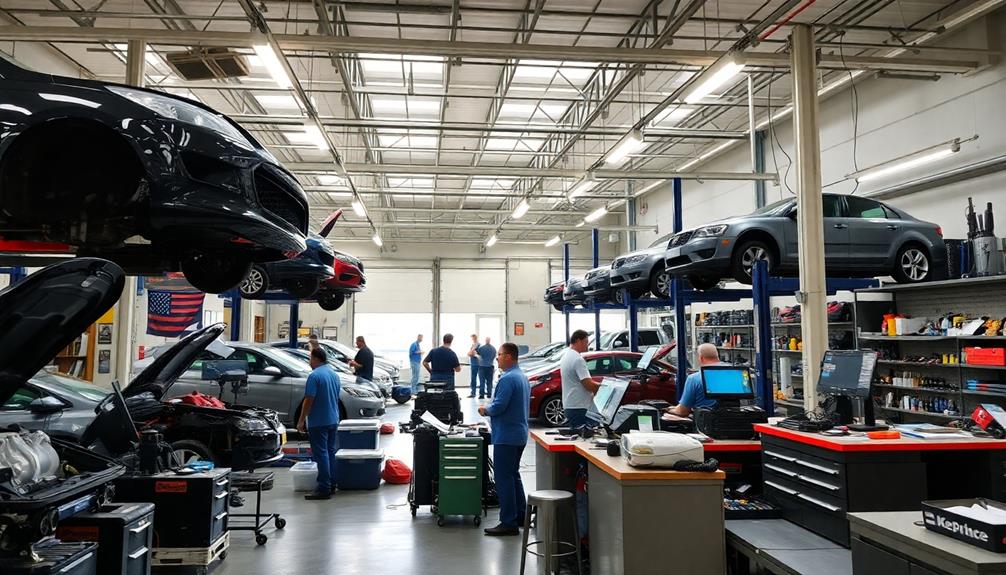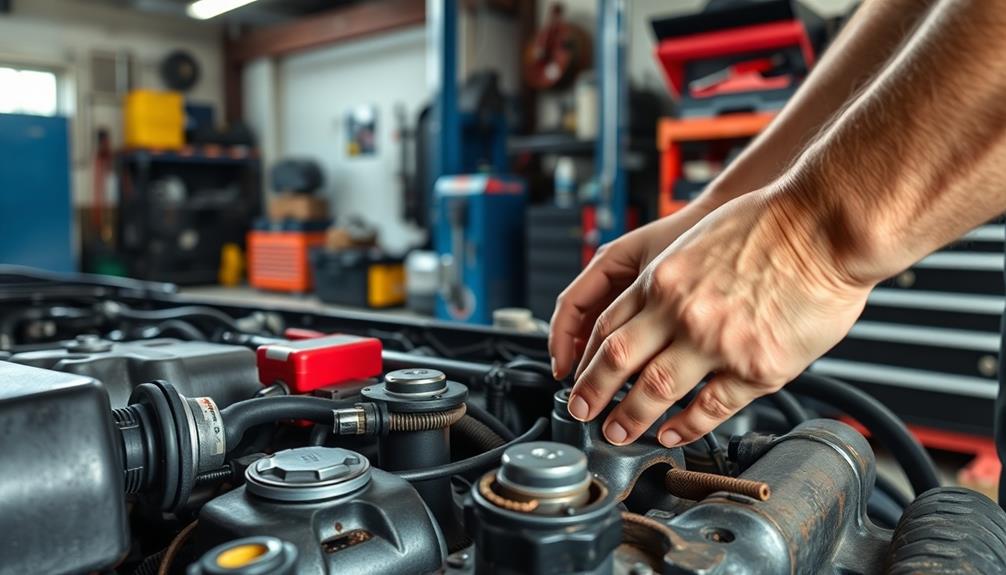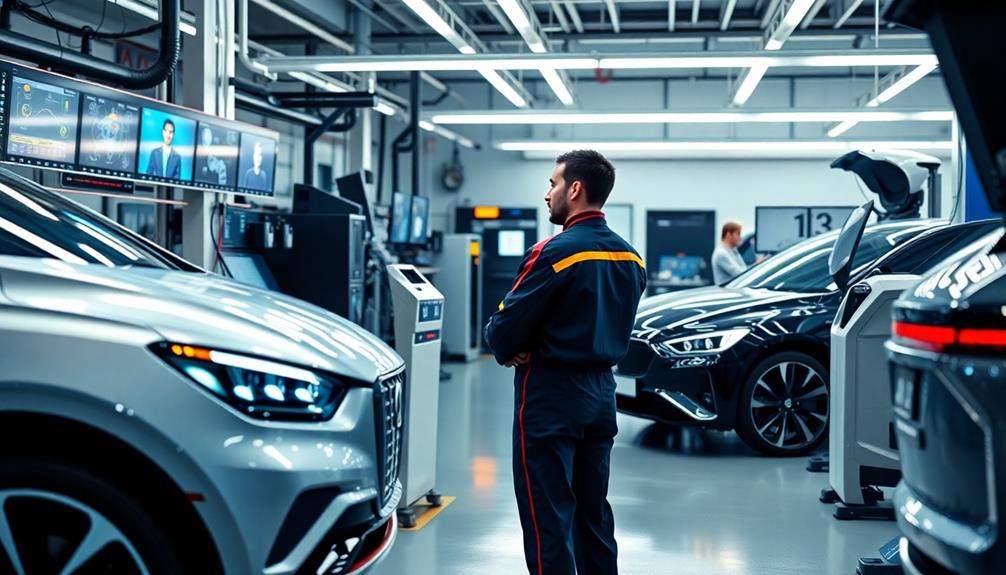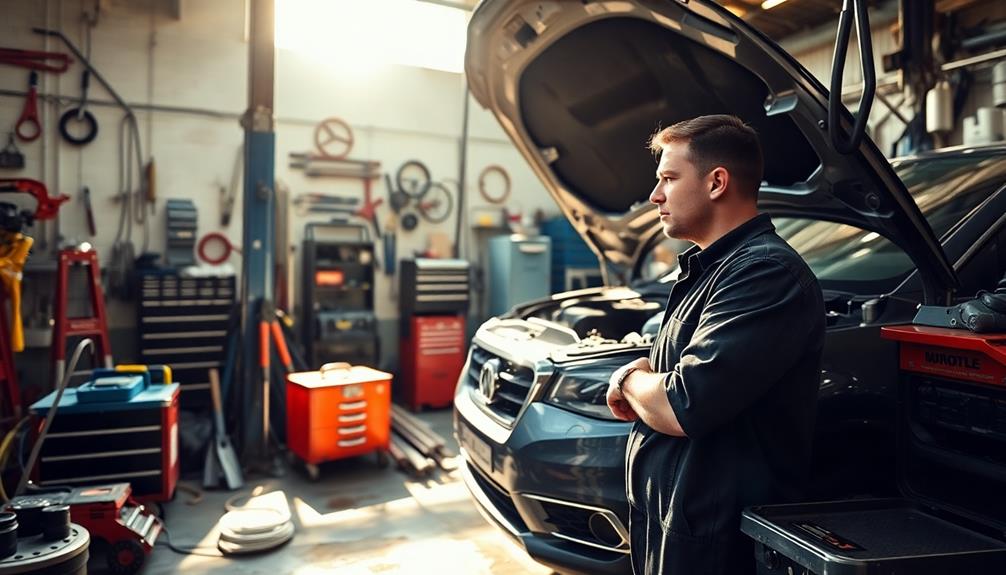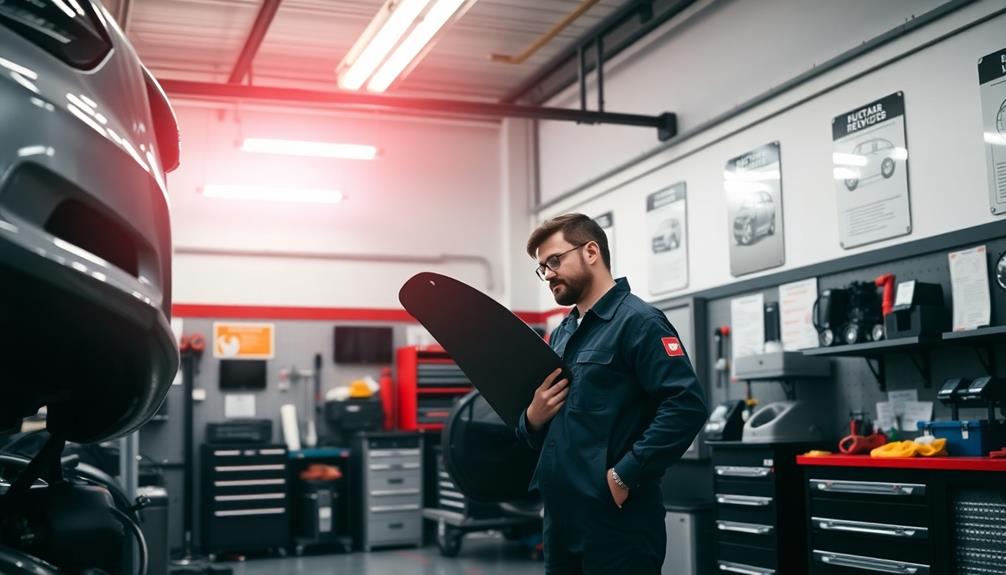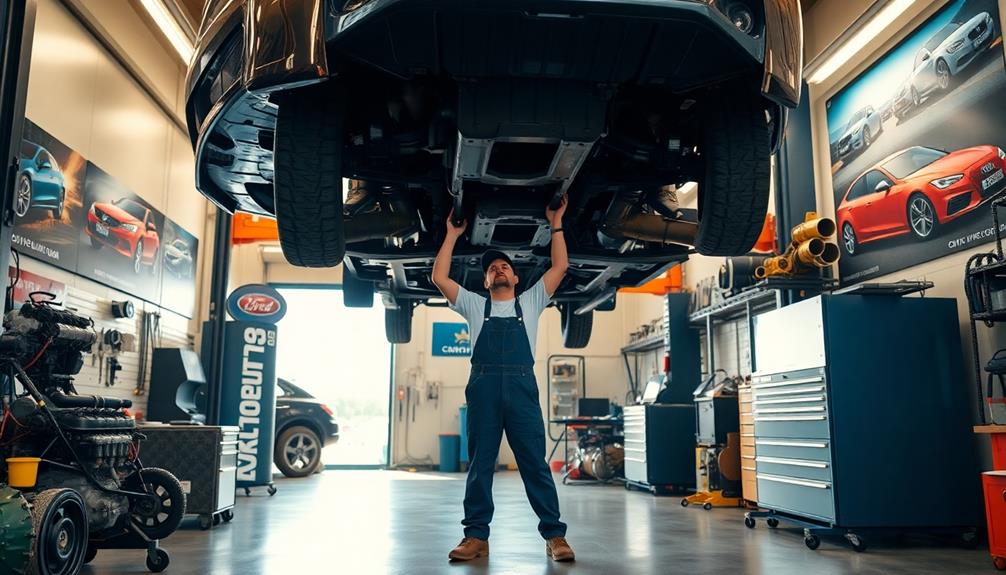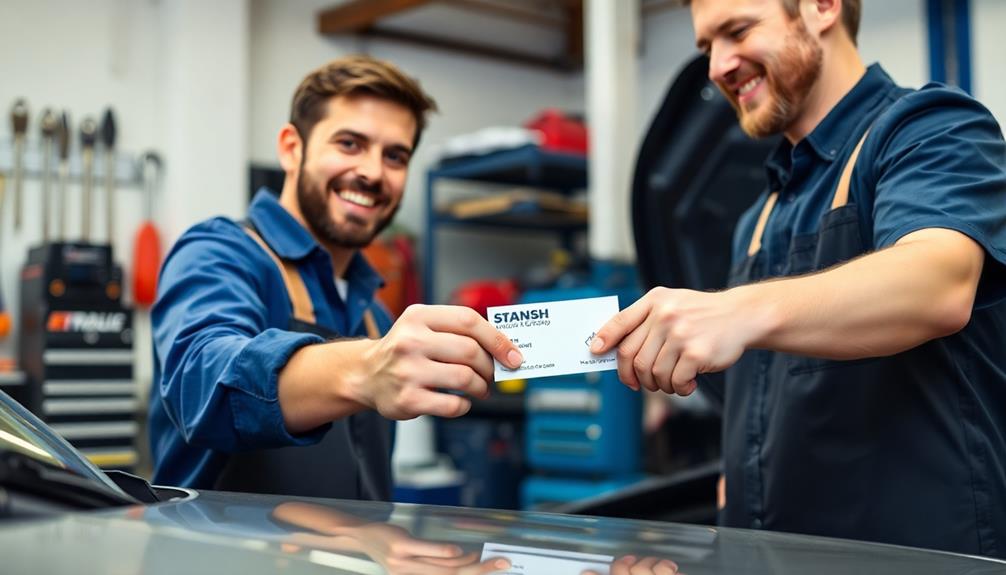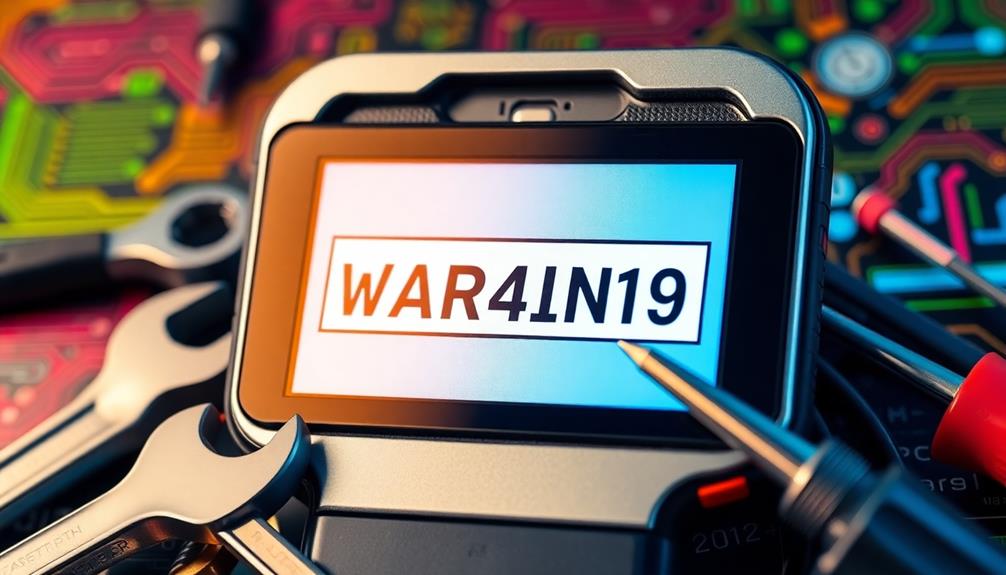An automotive repair dealer is a facility where you can get your vehicle diagnosed and repaired for a fee. These dealers are essential for keeping your car safe and reliable on the road. You'll find various types of dealers, like independent shops and dealership service centers, each offering unique services. They perform everything from routine maintenance to specialized repairs, using quality parts. Plus, they must follow specific legal requirements to operate. Understanding their role can help you make informed choices for your vehicle's care and maintenance. Keep going to discover more about their importance and services!
Key Takeaways
- Automotive repair dealers diagnose and repair motor vehicles for compensation, ensuring safety and reliability for drivers.
- They must be properly registered and licensed to operate legally, adhering to specific regulatory requirements.
- There are various types of dealers, including independent repair shops, dealership service centers, and specialized service providers.
- Services offered include diagnostics, routine maintenance, and specialized repairs, with a focus on using OEM parts in dealerships.
- Customer choice is influenced by factors like cost, quality assurance, communication, and trust in the repair dealer's reputation.
Definition of Automotive Repair Dealer
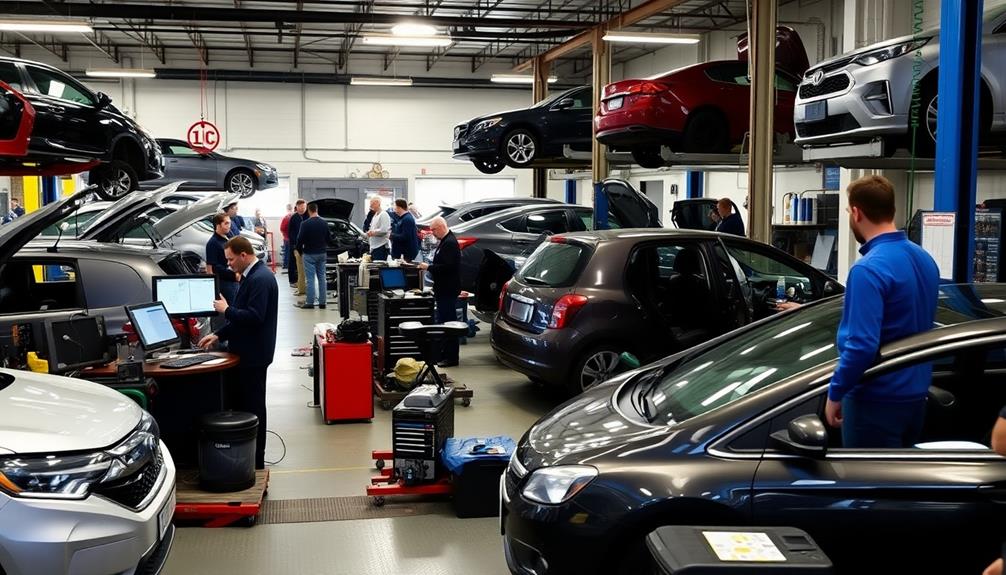
An automotive repair dealer's primary role is to diagnose and repair motor vehicles for compensation, as outlined in Section 9880.1 of the Business and Professions Code. These dealers include independent auto repair shops that offer essential services to keep your vehicle in peak condition.
They perform diagnostic services to identify issues, guaranteeing your vehicle remains reliable and safe.
To operate legally, automotive repair dealers must obtain proper registration and licensing. This process not only legitimizes their business but also guarantees they comply with state laws and regulations governing their operations.
Each dealer is assigned a unique registration number, like ARD266219, which can be revoked if they fail to follow the required guidelines.
Understanding the definition of an automotive repair dealer is significant for anyone seeking to maintain their vehicle effectively. These professionals play an important role in vehicle maintenance, contributing to the longevity and performance of your motor vehicle.
When you choose an automotive repair dealer, you're investing in the safety and reliability of your transportation, so make certain they're properly registered and licensed to provide the best service possible.
Types of Automotive Repair Dealers
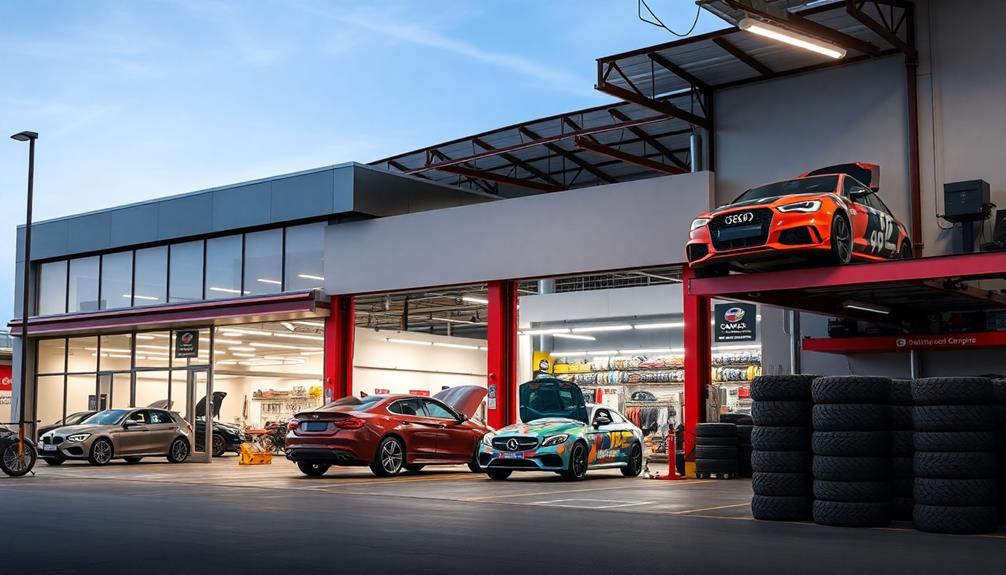
When you think about automotive repair dealers, you'll find a few main types to evaluate.
Independent repair shops offer a wide range of services, while dealership service centers focus on specific vehicle brands.
Specialized service providers, like tire shops or mobile mechanics, cater to niche repairs that meet unique needs.
Independent Repair Shops
Independent repair shops play a crucial role in the automotive industry, providing essential services for vehicle owners. These independently owned businesses specialize in a wide range of services, including general repairs, maintenance, and diagnostics for various makes and models.
If you're looking for affordable auto solutions, these shops often provide competitive pricing compared to dealerships due to lower overhead costs.
Many technicians at independent repair shops have experience from working at dealerships, which means you get specialized knowledge along with a more personal customer service experience. They can also handle services like smog or emission testing, ensuring your vehicle meets local compliance requirements.
Additionally, independent repair shops utilize a mix of OEM parts and aftermarket options, offering flexibility based on your needs and budget.
You might also find specialized types of independent shops focused on specific services, such as tire and wheel shops, muffler shops, auto body shops, and mobile mechanics. This variety allows you to choose the right shop that caters to your specific automotive needs, ensuring your vehicle stays in top shape without breaking the bank.
Dealership Service Centers
For those looking for specialized care for their vehicles, dealership service centers offer a focused approach to automotive repair. These centers are dedicated to servicing specific makes and models sold by the dealership, ensuring that you receive expertise in brand-specific issues.
When you choose dealership service, you benefit from factory-trained technicians who are well-versed in the latest technologies and diagnostic tools tailored to your vehicle.
One of the key advantages of dealership service centers is their commitment to using original equipment manufacturer (OEM) parts for all repairs. This guarantees not only quality but also compatibility with your vehicle, giving you peace of mind.
While it's true that labor rates at these centers might be higher compared to independent repair shops, this reflects the specialized training and overhead costs associated with maintaining high standards.
Moreover, many dealerships enhance your experience with additional amenities. You might find loaner cars, comfortable waiting areas with refreshments, and even shuttle services to make your visit more convenient.
When it comes to high-quality repair services, dealership service centers stand out as a reliable choice for your automotive needs.
Specialized Service Providers
Specialized service providers play an essential role in the automotive repair landscape, offering targeted solutions for specific vehicle issues. These providers include various types of automotive repair dealers, each focusing on distinct areas of maintenance and repair.
| Type of Provider | Services Offered | Key Features |
|---|---|---|
| Independent Auto Repair Shops | General repairs, smog testing | Often employ technicians with dealership experience |
| Tire and Wheel Shops | Tire installation, alignment | Focus on tires and wheel-related services |
| Muffler Shops | Exhaust system repairs | Specialize in mufflers and exhaust systems |
| Auto Body Shops | Collision repair, painting | Focus on bodywork and aesthetic repairs |
| Mobile Mechanics | On-site repairs | Convenience of service at your location |
These specialized repair shops guarantee that you get the expertise needed for your vehicle's specific issues. Independent auto repair shops often offer a wide range of services, while mobile mechanics bring convenience directly to you. Regulations like ASE certification help maintain quality across these automotive repair dealers, giving you peace of mind when seeking specialized services for your vehicle.
Services Offered by Dealers
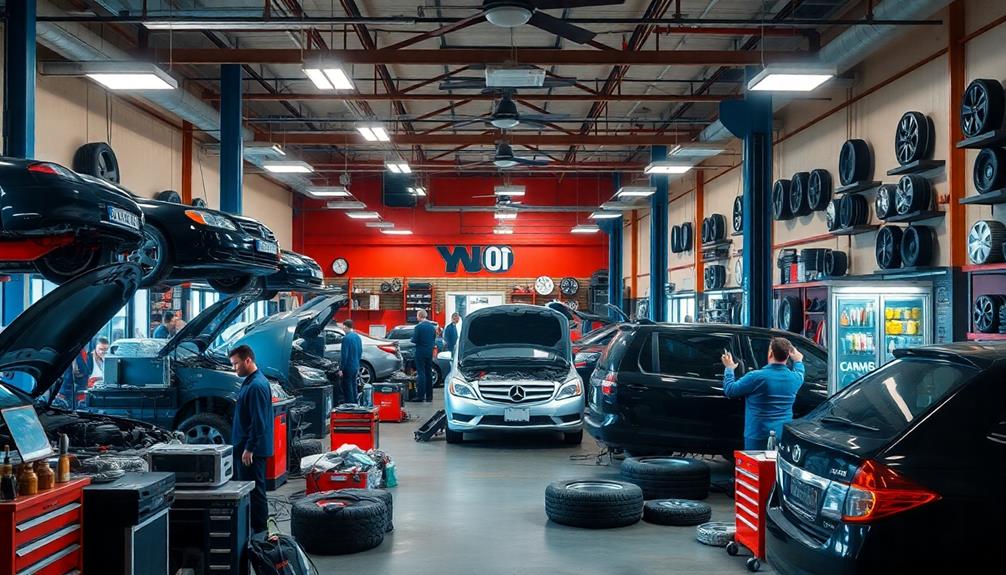
When you visit an automotive repair dealer, you'll find a variety of services designed to keep your vehicle running smoothly.
They offer everything from diagnostic services to routine maintenance and specialized repairs tailored to specific brands.
Plus, their factory-trained technicians guarantee you get the expertise and quality you need for your car.
Diagnostic Services Provided
Automotive repair dealers frequently offer diagnostic services that are vital for identifying vehicle malfunctions and ensuring effective repairs. These services play an essential role in evaluating issues, allowing you to address problems before they escalate. Using specialized tools and equipment, dealers perform diagnostics across various vehicle makes and models, ensuring accurate identification of issues.
One common aspect of diagnostic services is computer diagnostics, which evaluates electronic systems, engine performance, and other significant components of modern vehicles. This technology can pinpoint problems that mightn't be visible during a routine inspection. When you visit an auto shop, you can trust that their diagnostic capabilities are designed to meet your specific vehicle's needs.
Furthermore, many automotive repair dealers must maintain proper documentation of their diagnostic findings and services rendered. This compliance with state regulations enhances their reliability and credibility in the eyes of consumers.
Maintenance and Repairs
After identifying potential issues through diagnostic services, maintaining your vehicle is the next step to guarantee its longevity and performance.
Automotive repair dealers offer a variety of maintenance and repair services that keep your car running smoothly. Here are some key services you can expect:
- Oil changes to keep your engine lubricated
- Brake inspections to verify your safety on the road
- Tire rotations for even wear and extended tire life
- Engine tune-ups to optimize performance
Using original equipment manufacturer (OEM) parts, these dealers ensure that any repairs maintain your vehicle's integrity and warranty.
Routine maintenance is essential, and it often includes critical services like transmission fluid changes. By following the recommended maintenance schedule, you can prevent more significant issues down the line.
Additionally, many dealers provide advanced services such as software updates and recall repairs, specifically designed for the models they sell. This not only enhances your vehicle's functionality but also its safety. By relying on authorized dealers for these services, you ensure that your car receives the most up-to-date and manufacturer-approved fixes, avoiding potential issues that could arise from unverified sources. Importantly, reputable dealers also steer clear of any banned auto repair trick, which could compromise the performance or legality of your vehicle in the long run. This level of trust and reliability offers peace of mind, knowing that your safety and the vehicle’s integrity remain intact.
Trusting automotive repair dealers for your maintenance and repair needs helps you keep your vehicle in top shape.
Specialized Brand Services
Typically, specialized brand services offered by dealerships guarantee your vehicle receives the highest level of care tailored to its specific make and model. These dealerships focus on providing expert service, employing technicians who undergo specialized training directly from manufacturers. This ascertains they possess deep knowledge and the right tools to diagnose and repair issues accurately.
One of the key benefits of using a dealership for service is their access to original equipment manufacturer (OEM parts). These parts help maintain your vehicle's original quality and performance, unlike generic alternatives that mightn't fit as well or last as long. The use of OEM parts is vital for keeping your vehicle running efficiently.
Additionally, many dealerships offer brand-specific diagnostic services using proprietary software and tools. This capability allows them to tackle repairs that independent shops may struggle with.
To enhance your experience, dealerships often provide amenities like loaner vehicles and thorough service packages designed specifically for your brand. By choosing a dealership, you guarantee your vehicle receives specialized care, making it a smart choice for maintaining your investment.
Regulatory Compliance Requirements
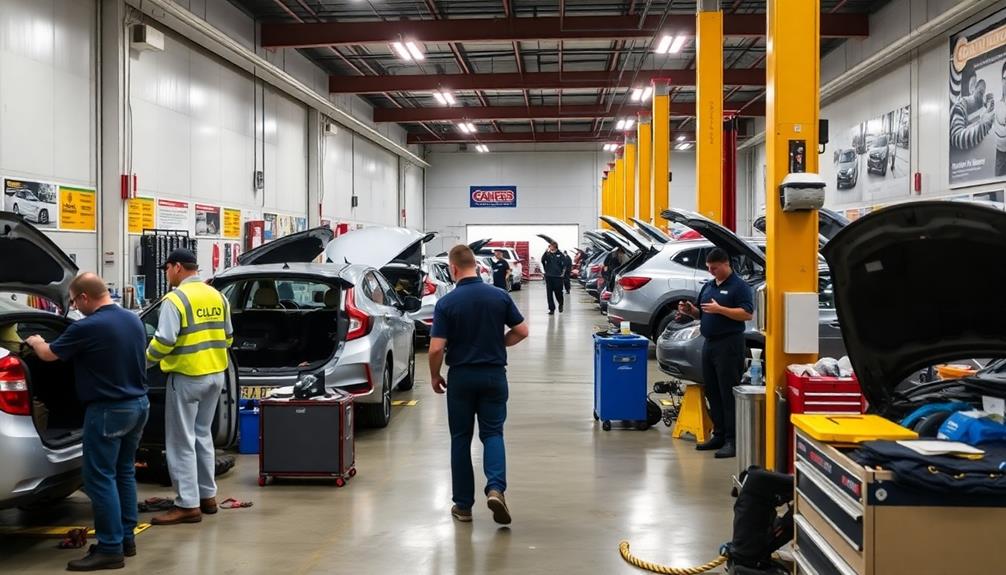
Regularly verifying compliance with regulatory requirements is essential for automotive repair dealers to operate legally and successfully.
You need to register and obtain a license as mandated by Section 9880.1 of the Business and Professions Code. This verifies you can provide services without the risk of revocation due to non-compliance.
To maintain your registration, focus on these key compliance areas:
- Document all services rendered, including customer consent and repair details.
- Adhere to safety and environmental regulations to protect the public and the environment.
- Prepare for regular inspections and audits from regulatory bodies to verify compliance.
- Stay updated on state laws and regulations that impact your service departments.
Differences Between Dealerships and Independent Shops
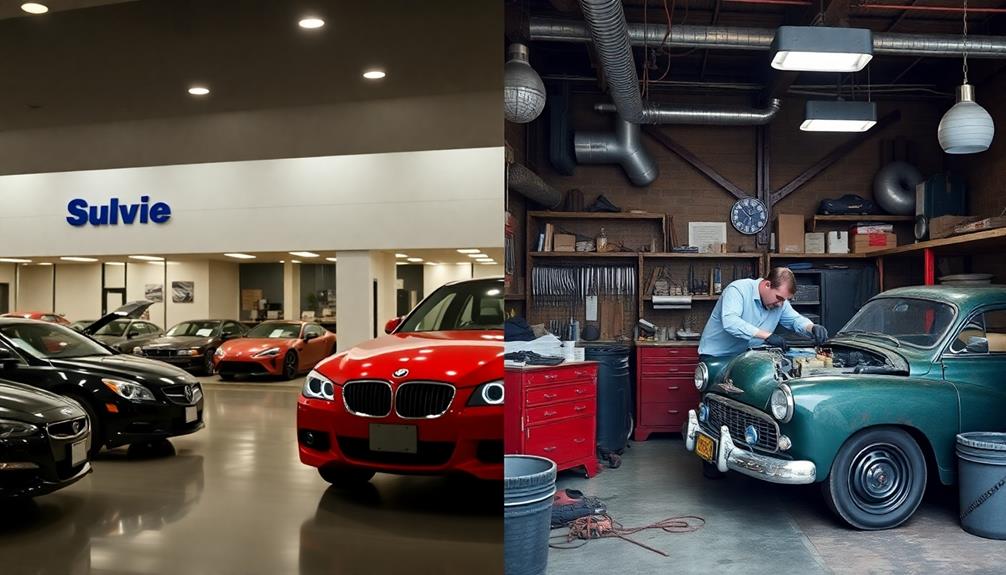
When choosing between a dealership and an independent shop for automotive repairs, understanding the key differences can help you make an informed decision. Dealerships typically focus on specific brands and use original equipment manufacturer (OEM) parts, while independent shops cater to a wider variety of makes and models, often opting for cost-effective aftermarket parts.
Here's a quick comparison:
| Feature | Dealerships | Independent Shops |
|---|---|---|
| Parts Used | OEM parts | Aftermarket parts |
| Labor Costs | Generally higher | Generally lower |
| Communication | Through service advisors | Direct with mechanics |
| Technician Training | Specialized for specific brands | Diverse experience and certifications |
While dealerships may offer amenities like loaner cars, independent shops usually provide a more personal touch, leading to higher customer satisfaction ratings. However, dealership technicians receive specialized training that can enhance service quality. Ultimately, your choice may depend on your vehicle's make, your budget, and the level of personalized service you're seeking.
Factors Influencing Customer Choice
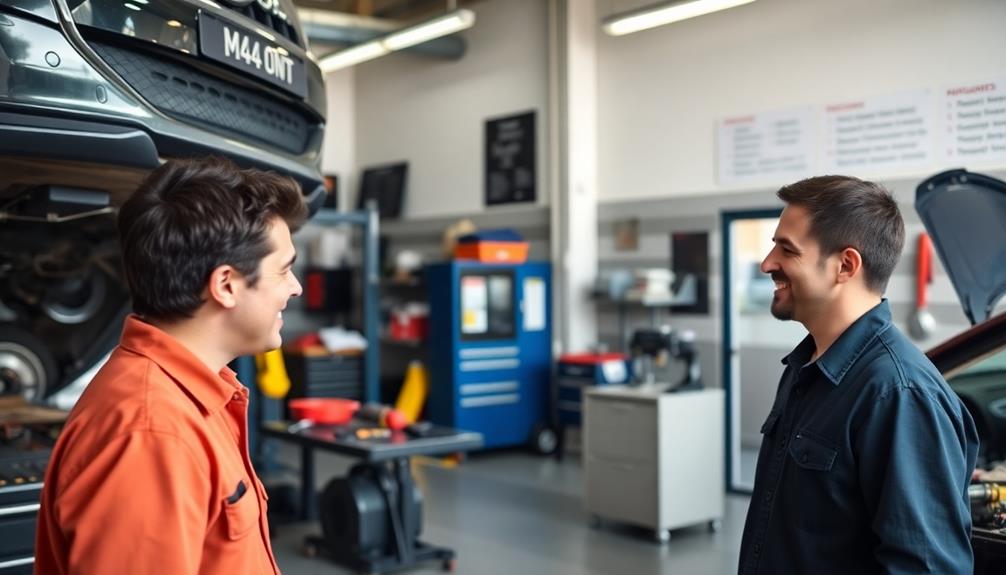
Choosing where to take your vehicle for repairs involves more than just weighing the differences between dealerships and independent shops; several factors can greatly influence your decision. Here are some key considerations:
- Quality Assurance: Dealerships often use OEM parts and employ factory-trained technicians, which can provide peace of mind regarding quality.
- Cost: Independent auto shops typically offer more competitive pricing and upfront estimates, making them an attractive option for budget-conscious customers.
- Communication: You may find that independent shops allow for more direct interaction with mechanics, leading to a more personalized service experience.
- Trust and Reputation: Independent shops often build strong community ties and receive positive reviews, while dealerships might face scrutiny based on service experiences.
Ultimately, your choice may hinge on which factors matter most to you.
If you prioritize quality and factory standards, dealerships might be the way to go.
However, if cost, personalized service, and community trust resonate more with you, an independent auto shop could be your best bet.
Evaluate these factors carefully to make the most informed decision for your vehicle's repair needs.
Importance of Automotive Repair Dealers
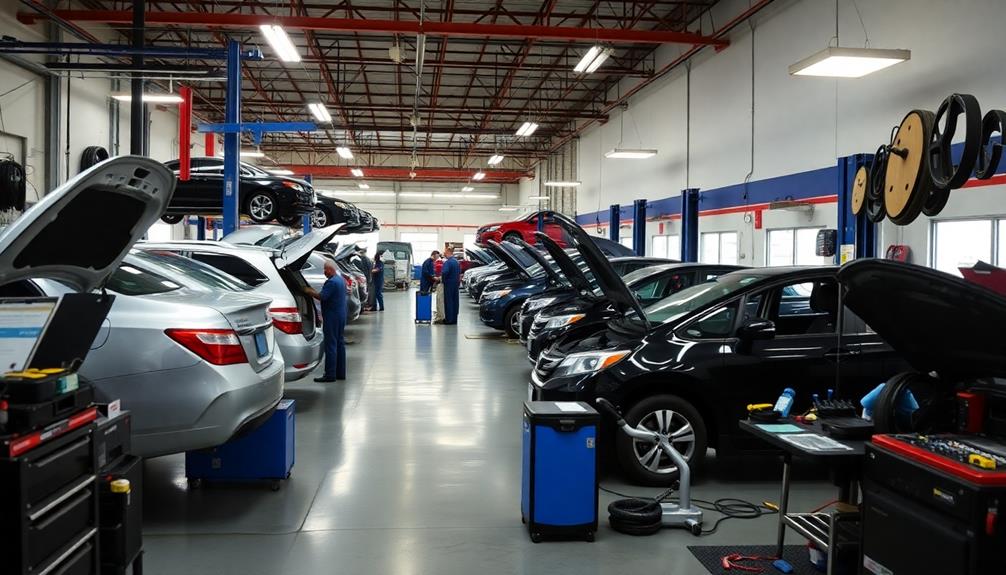
Automotive repair dealers are vital to keeping your vehicle safe and dependable, greatly impacting its longevity and performance. They provide a range of services that guarantee your car runs efficiently, from routine preventative maintenance to more complex repairs.
Regular visits to these dealers help catch potential issues before they escalate, saving you time and money in the long run.
As vehicles become increasingly complex, automotive repair dealers are important in addressing this demand. Their expertise allows them to navigate the intricacies of modern technology, making sure your vehicle receives the proper care it needs.
They often use original equipment manufacturer (OEM) parts, which maintain your car's integrity and performance, giving you peace of mind.
Moreover, automotive repair dealers support the economy by creating jobs and fostering a dependable automotive service industry. Regulatory frameworks help maintain service quality and protect consumers, enhancing your trust in these professionals.
By choosing an automotive repair dealer, you're not only investing in the health of your vehicle but also supporting an important sector that benefits everyone.
Future Trends in Automotive Repair
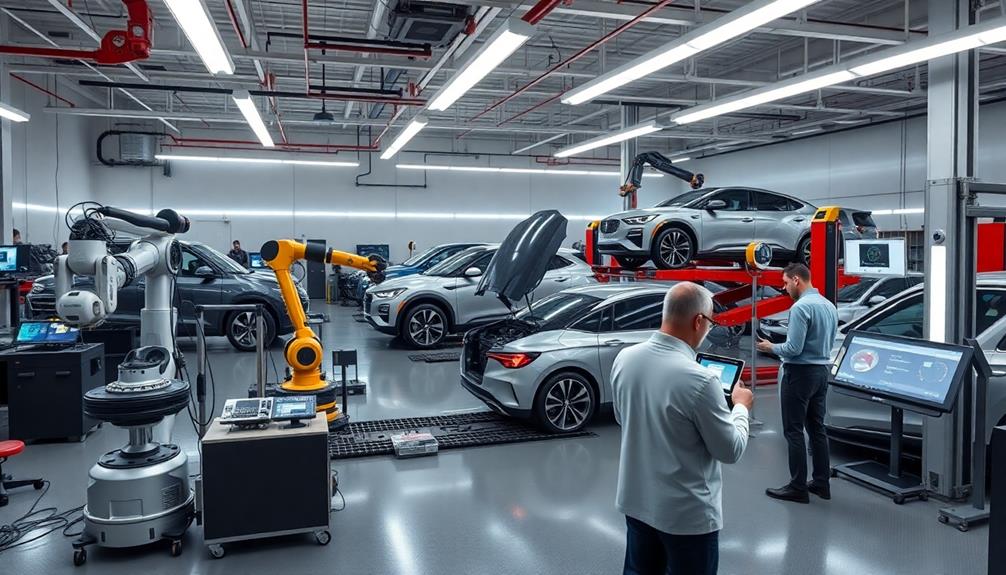
The future of automotive repair is set to transform dramatically, driven by innovations that enhance service quality and efficiency. As a consumer, you'll notice several key trends that will shape your experience.
- Mobile repair services are on the rise, bringing convenience right to your doorstep.
- The surge of electric vehicles (EVs) means repair dealers are investing in specialized training and equipment to handle unique maintenance needs.
- Telematics integration will allow for real-time data sharing, enabling proactive maintenance and timely repairs based on your vehicle's performance analytics.
- Growing sustainability trends push automotive repair dealers to adopt eco-friendly practices, such as using environmentally safe products and implementing waste reduction strategies.
These advancements not only improve the quality of repairs but also guarantee that they align with the evolving demands of consumers like you.
With these trends, you can expect a more efficient, convenient, and environmentally conscious automotive repair experience. Embracing these changes will be crucial for repair dealers to stay competitive and relevant in this fast-paced industry.
Frequently Asked Questions
What Is the Meaning of Automotive Repair?
Automotive repair means fixing, maintaining, or diagnosing vehicles to guarantee they run smoothly. You'll address issues, perform routine maintenance, and replace parts, helping to keep cars safe and functional on the road.
What Is the Difference Between Mechanic and Auto Repair Shop?
A mechanic's an individual who repairs vehicles directly, while an auto repair shop's a business that employs multiple mechanics. You'll often find independent shops offer broader services compared to brand-specific dealerships.
Is It Better to Go to a Local Mechanic or Dealership?
Did you know that 70% of customers prefer independent mechanics for their car repairs? Choosing a local mechanic often means cost savings, personalized service, and quicker availability compared to a dealership, making it a smart choice.
Why Are Dealer Mechanics so Expensive?
Dealer mechanics are expensive because they charge higher labor rates, use OEM parts, and employ specialized staff. Plus, they offer amenities like loaner vehicles, which all contribute to the overall cost of repairs.
Conclusion
In the ever-evolving world of automotive care, automotive repair dealers are your trusty pit stops, ensuring your vehicle runs like a well-oiled machine. Whether it's routine maintenance or complex repairs, these dealers play an essential role in keeping you safe on the road. As technology advances and customer needs shift, they'll continue to adapt, just like your car maneuvering through twists and turns. So, the next time you need help, remember these dealers are your reliable co-pilots on the journey ahead.
